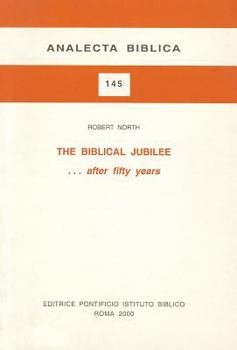The Biblical Jubilee: After Fifty Years
This is not a second edition of Analecta Biblica 4, the author's dissertation on the Jubilee chapter Leviticus 25 written in 1950 and published in 1954 with the title Sociology of the Biblical Jubilee. Rather we have here a survey of the numerous more recent views on various aspects of the Jubilee, of course together with some modifications or additions to the author's previous position. But a new userfriendly approach has been aimed at a more general public, with updated examples and special emphasis on relevance for the Jubilee of 2000. Only two points are singled out as real innovations: (a) the chapter is not just a summary of social justice reforms previously initiated, but focuses exclusively the small farmer's property to be protected from debt in order that the land may always remain inalienably within the important families of the original (Joshua-era) settlement; (b) recent researches on biblical urbanization to some extent show that, despite proliferation of unwalled villages around 1100 b.c., the 48 principal cities (also designated as Levitical) probably housed many small or tenant farmers, and ', thus new exegetical problems are created regarding their access to the land they were tilling. Another innovation, cited rather than proposed, is '; that the seventh year fallow of which the Jubilee was a heightening would have had to be much more frequent, even every other year, to be l of any use to agriculture; but this is not stated to be its intention, and the cultic cyclic universal fallow is claimed to have possibly coexisted beside a different practical-farming kind.
Format:Paperback
Language:English
ISBN:8876531459
ISBN13:9788876531453
Release Date:January 2000
Publisher:Gregorian & Biblical Press
Length:168 Pages
Weight:0.60 lbs.
Dimensions:0.4" x 6.4" x 9.3"
Customer Reviews
0 rating





